Tuesday, April 12, 2011
Don’t bet on the joys of the pokies
When I was working in the Cairns Casino I’d often arrive on the floor to replace a guy who had been in the industry as long as casinos had been in Australia. He had started back at Wrest Point in a time when people would dress up to go to the casino, and the penalty rates for dealers were so outrageous that some used to work casual for half the year, then take the other half off skiing around Europe. He would often greet me by saying, “Welcome once again, young man to this international playground of the idle rich.” It was a standard joke the two of us had as we then looked around and saw no playground, and certainly no idle rich.
The line was a sort of gallows humour – an attempt to divert us from the grim task we were there to do – namely, take money from people, and make them feel good while doing it. One of the other jokes we had was to refer to the pokies in the casino as “wages” – they took people’s to pay ours.
This joke was unfortunately much nearer the truth.
Working in a casino provides an interesting insight into people’s psyche – on both sides of the gaming tables. One of the first things a new dealer has to get used to quickly is to not give a damn about whether the punters won or lost – because they mostly lost. Often the reaction of the staff was then to become indifferent – all that mattered was that things were run well, that everyone was happy, that turnover was good, that no mistakes were made. Punters would often accuse us of wanting them to lose – mostly that was not the case (unless they were particularly loathsome), we didn't need to want them to lose, mathematics took care of that for us. On the games I dealt and supervised the House advantages were as follows:
Blackjack – 0.80%
Baccarat (banker) – 1.17%
Baccarat (player) – 1.63%
Roulette (single zero) – 2.7%
Caribbean Stud Poker – 5.26%
Big Wheel – 11.1% to 24%
Sic-Bo – 2.78-18.98%
We didn’t need to wish or try and rig the game, the mathematics had rigged it for us already. All we had to do was keep the turnover going and keep you happy – happy enough so that if you did happen to win, you would come back. Because the the golden rule of the casino world is that the house always wins in the end.
Usually I worked nights, but for 6 months I worked on the day shift and it was without any doubt the most depressing time of my life (the only time that came close was the period that I worked night shift). At night there is always a chance you’ll be dealing to tourists and people out for a night; but during the day for the most part you are dealing to addicts.
The casino doors would open at 10am, and within a week I could predict 6-7 of the first 10 through the door. Many were pensioners. Those I did know played roulette; the many more I didn’t know played the pokies.
In life you often look around for someone or something to compare yourself favourably with. For the games dealers and supervisors in a casino whose souls are troubled can look to the poker machines and say, well at least we provide entertainment (we’re in the hospitality industry, don’t you know!). But in reality, that was just bullshit we told ourselves. The machines blinked and made music while they took the money; we smiled and chatted aimlessly while we took it.
We liked to think that the pokies were the ones that did the damage but the fact is all casino games do damage, just more slowly, and with a smile. If you were a regular we quickly signed you up to the Casino Club. This meant that when you bet you gave us the card and we recorded how much you bet, for how how long and how much you won or lost. It was like a frequent flyer card – the more you bet the more points you were awarded that got you free drinks, meals, rooms in the hotel etc.
Of course that was all just a guise. It was there to ensure we knew where our money was (it is the casino’s money – if you are a regular and you won, we’d refer to it a “short term loan” – and we sure as hell knew it would come back with interest).
The worst moment for me as a dealer was during that 6 month day-shift stint, when on a quiet day in came a couple on their honeymoon. They were full of joy and love and life was grand and beautiful. And then they came to my Blackjack table. The husband, took out $50 from an envelope – it was obviously their holiday spending money – and the careful way they treated the envelope gave a pretty good indication that it was all they had to spend.
They bet $10 a hand and I took it all off them in 5 hands. This was unlucky, but not remarkable. It was a bugger because they were actually very nice and I would have liked to be able to chat to them on this very boring shift; and given it was their honeymoon it would have been nice to see them win.
They moved to leave, but then they looked at each other with a “well we’re only here once” and put down another $50. This time it took me a bit longer to win it, but win it I did.
Now the faces were losing that flush of joy and happiness and life and grandness and beauty. For the first time in ages I was truly sad and wished I could somehow help them to win (but alas, mathematics had them beat). I apologised and wished them well – almost telling them to leave – but instead of going the husband said let’s try it one more time and pulled out not $50 but $100, which I then took in less than 20 hands. Blackjack can be fast, but when you are the only player on the table, it is lightning.
And so they put the envelope back in her bag, and it dawned on them that the $200 which could have been spent on a trip out to the reef, or on a couple dinners, or presents to each other, or perhaps just a crap load of souvenirs was now in the money box on my blackjack table, and it wasn’t coming back. No beauty, grandness, life, love, joy or happiness went with them.
Such examples caused me to go very close to the edge after two years of full time work, and so I went back to university, worked casual at the casino for another four years until the bile inside me from working there reached a point that I walked out after one shift and never rang up to ask for another shift.
This of course – in a very long and windy way – brings me to the
Wilkie-Xenophon anti-pokies proposal.
One of the other jokes we had was about the poker machines in the casino was that no casino ever took out poker machines to put in more blackjack tables. It was another gallows humour joke, because we always knew our job could be replaced by a machine. The reason of course is because each poker machine doesn’t need a dealer, they have a lot higher turnover and better winning percentage.
The truth of this can be seen in the
Productivity Commission’s 2010 Report into gambling. Pokies are to gambling like Crack Cocaine is to drugs. We on the gaming tables were dealing out the gambling equivalent of marijuana and Ecstasy (not good, but good enough that in a moral free zone you could convince yourself you weren’t too bad), but the pokies? Wow.
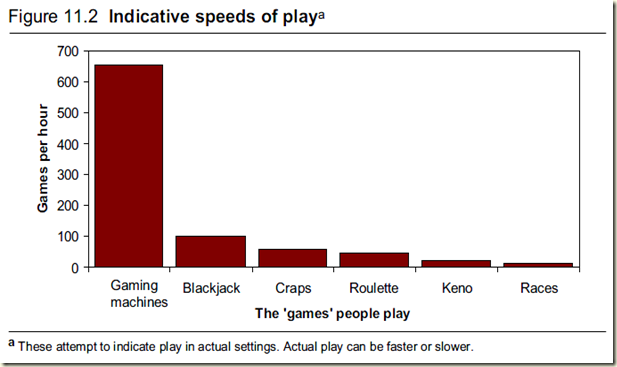
It’s all about speed. The best thing about my abilities as a dealer was that I was fast; I may have been the least hospitable dealers in the history of the industry, but management loved that I churned out the cards and kept the ball spinning. Turnover is the key. I was fast, but unless you were the lone player on the table, there was no way I could match the pokies.
And the horses? There may be race meetings all over the country and throughout Asia, but you’re still going to have to wait to bet – and geez they take ages to run around the track and then there’s the whole correct weight thing.
You want to spend money, and you want to spend it quick (and let me tell you that is what the owners of casinos and clubs want you to do)? Then sit yourself down and start feeding in the notes – no need to worry about some human changing the money for casino chips and then dealing out cards – just press that button as fast as you can.
And how fast is that? The Productivity Commission tells us that as well:
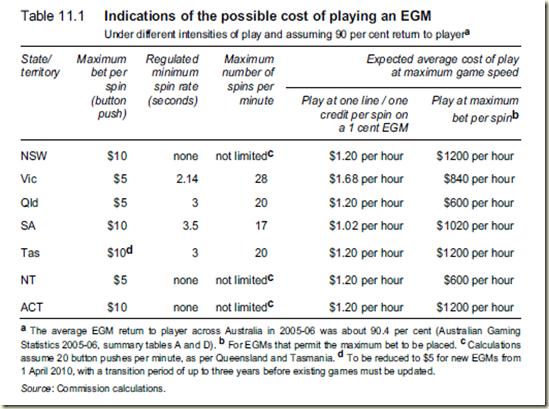
In NSW there are no regulated spin rates – so you can be sure it’s short – all the quicker to allow you to press the button again, and given Victoria can allow 28 spins a minute (up to $10 a pop) that is zipping by too fast to even register the losses. But losses there can be – $1,200 an hour.
Now I certainly saw people lose $1,200 in an hour – but not at the seemingly low value $10 a hand. In fact $10 black jack tables are about the cheapest you can get nowadays – the casino makes up for the lack of speed by increasing the minimum bet. To lose $1,200 in an hour on blackjack would have meant you doing some serious punting – probably $25 a hand at minimum.
The Productivity Commission also nicely shows the adage that the House always gets you in the end is true. As you can see in the upper left graph below, 30 per cent of players can win if they just play the pokies one session of one hour. That sounds about right – a group of 10 friends playing the pokies – three winning, the rest losing seems about right. Come back four times though and that winning percentage is down to 21 per cent. Sixteen times – and only 7 per cent. Sixty four times – and yes, we may well be talking problem gamblers here – and the winning percentage is 1 per cent.
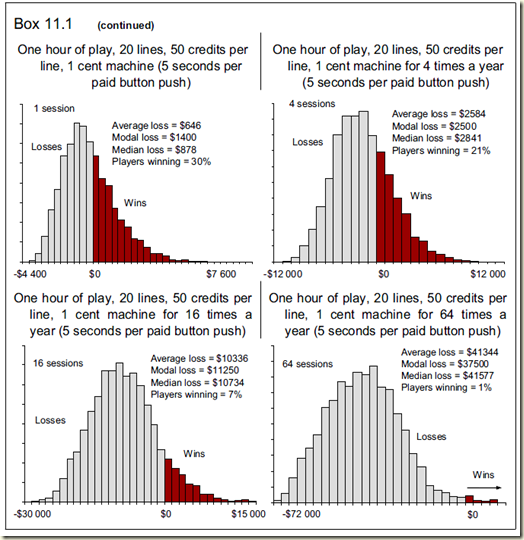
The problem is that people addicted to gambling focus on the 30 per cent and ignore the 1 per cent. How many people do you know who gamble who tell you about the wins, but from whom you never hear the losses? It’s not just because they don’t talk of losses, it often is because they have forgotten them – until the time comes that they are so big that they can’t be ignored, and so they keep playing thinking this session they’ll be one of the 30 per cent, not realising they’re already in the 99 per cent losers category. (And remember we;re not talking the horses where you can study the form guide and make an educated bet – this is you against mathematics – the machines are programmed to win)
Reading the submissions from clubs into the Parliamentary
Inquiry into pre-commitments scheme is like going back in time and hearing the protestations from tobacco companies when they were being banned from sponsoring sports. All the talk is of the valuable input into the community and into sport that the revenue from the clubs provides. For example the submission from Clubs WA which is the only state not to have poker machines in clubs complains about that fact:
"Western Australian clubs are smaller and have much lower revenue and smaller capital expenditure, employ fewer people, are able to donate less to charity and sport groups, provide more limited services, and have a smaller economic presence and contribution. A stronger club industry in Western Australia would bring benefits to all. It would increase club viability and expand the benefits they could provide to their communities."
I love how there is all this talk of more revenue but with bugger all acknowledgement of what that means – it means people are losing money. The Commission also found that the people contributing to this lovely revenue are not all just having a “flutter”:
About 4 per cent of adults play gaming machines weekly or more often. Around 15 per cent of this group would be classified as problem gamblers, with around an additional 15 per cent experiencing moderate risks. And their share of total spending on machines is estimated to range around 40 per cent.
So how good is it to know that 40 per cent of any so called “benefits” of sporting equipment etc comes from people addicted to gambling?
The Productivity Commission also looked at these societal benefit claims as well, and found they were all a bit rubbery. Take sport. The PC found there was no correlation between number of poker machines and kids playing sport:
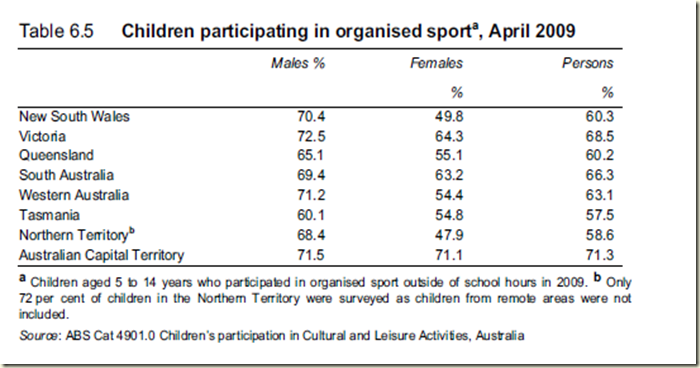
WA had more kids as a percentage playing sport than either NSW or QLD – the two states with the longest and deepest pokies and clubs cultures. The commission also found that the bigger the club was in terms of poker machines, the less money as a share of revenue was spent on sporting facilities – ie more pokies did not lead to better facilities:
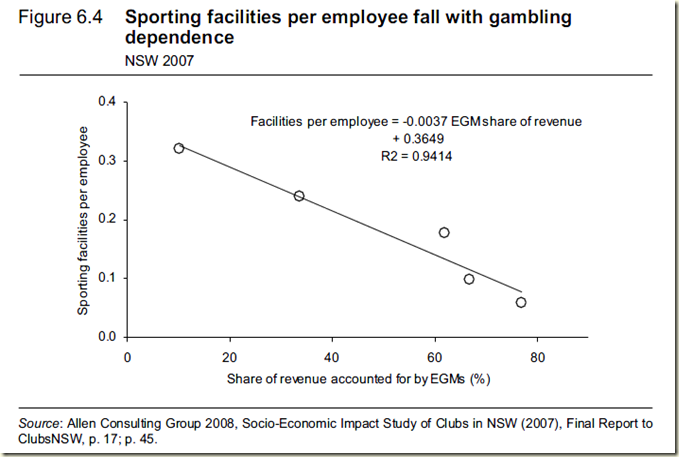
The Productivity Commission also found that the talk of employment was pretty iffy as well – because the assertion by the clubs implied that the people employed there would not be able to find other work. It found
Many people are employed in the gambling industry. However, most are highly employable and would be in demand in other parts of the service sector were the gambling industry to contract. In that sense, the gambling industries do not create net employment benefits, because they divert employment from one part of the economy to another.
But the Productivity Commission then did the figures and found this surprising statistic:
While it is not possible to be definitive about the costs and benefits of gambling, the Commission estimates that in 2008-09:
- the benefits from tax revenue and enjoyment of gambling for recreational gamblers ranged between $12.1 and $15.8 billion
- the costs to problem gamblers ranged between $4.7 and $8.4 billion
- the overall net benefits ranged between $3.7 and $11.1 billion.
So it seems all is good then – there are costs to gambling, but the benefits outweigh it? No need to do anything? Well yes, except straight afterward the Commission includes this very telling point:
The net benefits could be much larger if governments reduced the costs through effective prevention and harm minimisation policies.
And what do they consider to be the best harm minimisation policy? Well there are many – but the key one for poker machines was this:
Each state and territory government should implement a jurisdictionally-based full pre-commitment system for gaming machines by 2016, subject to initial development (recommendation 19.1), trialling (recommendation 19.2) and compatible monitoring systems (recommendation 10.6). This system should:
- provide a means by which players could voluntarily set personally-defined precommitments and, at a minimum, a spending limit, without subsequently being
able to revoke these in the set period
- allow players to see their transaction history
- encourage gamblers to play within safe spending and time limits, by specifying default limits
- include the option for gamblers to set no limit on their spending as one of the system options, but with periodic checking that this remains their preference
- allow occasional gamblers to stake small amounts outside the system
- include measures to avoid identity fraud
- ensure players’ privacy
- be simple for gamblers to understand and use
- present few obstacles to future innovation in the presentation and design of the system
- apply to all gaming machines in all venues in a jurisdiction, with an exemption until 2018 for venues with less than ten machines that also face significant implementation costs relative to revenue.
This is what Wilkie wants – note a few key things – “allow occasional gamblers to stake small amounts outside the system”. So no, it is not a licence to gamble. Is this an infringement on liberty? Pfft. No more than my having to show ID when I buy the pseudoephedrine cold and flu tablets at the chemist. Does it stop me buying them? Nope.
Let’s cut the crap about “nanny state”. You like betting on the horses? Nothing will change. You like playing blackjack? Nothing will change. You like betting on the AFL? Nothing will change. You like playing the pokies. Well you would need to get a card and set a limit on how much you will lose. The big thing – you choose. Here’s what Xenophon says:
Mandatory pre-commitment allows gamblers playing these high intensity machines to choose what they are willing to lose before they start using the machines. It will be a national system to protect all Australians who may become addicted to poker machines.
So people choosing for themselves how much they are prepared to lose is a restriction on people's rights?
Please. Imagine if say you had a credit card where you were able to set how much you could borrow against it, would you consider that an infringement on your rights? Of course not, because we all have that right now. My wife and I constantly get letters from our bank telling us we can increase our limit, but we don’t because we are happy with what we have – it protects us – it forces us if we want to use more credit to transfer real money into our credit card account.
The Clubs Association in response to the Wilkie-Xenophon reforms have gone absolutely ape-shit. And started an advert campaign including this absolutely stupid ad:
http://www.youtube.com/watch?v=t_AsiVAiKfU
First off, who the hell do the Clubs think are their members? If this advert is anything to go by they think they are all Neanderthal dopes whose parents are supremely glad they learned to walk upright.
Need a licence to bet $10? Nope. Government tracking you? Nope. (But don’t worry, the clubs will but think of it a frequent flyer points, remember). And as for the Government telling you how many beers you can have? Well they do already – unless you haven’t noticed all the signs in pubs saying they can’t serve people who are intoxicated. In SA for eg:
It is an offence to serve liquor to a person whose speech, balance, coordination or behaviour is noticeably impaired and it is reasonable to believe that the impairment is the result of the consumption of liquor.
So yep the law already says how many beers you can be served. And then there’s the sporting grounds who don’t allow you to bring beers into the ground etc etc, so let’s not carry on like the world is a total beer free-for-all.
Sure my views on gambling are biased from my time being part of the problem, but the Productivity Commission is not generally known as a cuddly, basket weaving won’t somebody think of the children type organisation. I would be against the Government setting limits on losses – but we’re not there – as Xenophon above points out.
Gambling is already restricted to those over 18 – you think that might give away the fact it has some negative impacts – so let’s not pretend that we can come out of the womb and start playing the pokies.
These new laws aren’t about stopping your fun, they’re about helping those for whom it is no longer fun, and they no longer can stop. And what the clubs want you to forget is that 40 per cent of their revenue is from these people. I don’t think Governments need to always tell us what to do (but I have no problems with say seat belt laws or road speeds) but Governments should help the helpless.
Problem gamblers need help, if that means you have to get a card before you go blow $200 on the pokies? Big deal.






